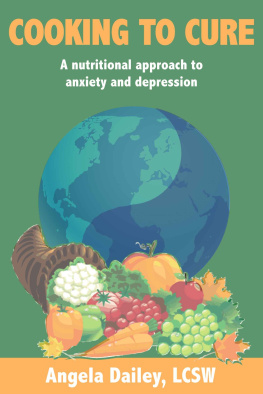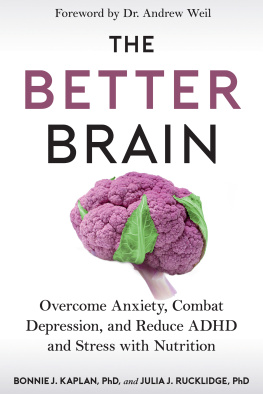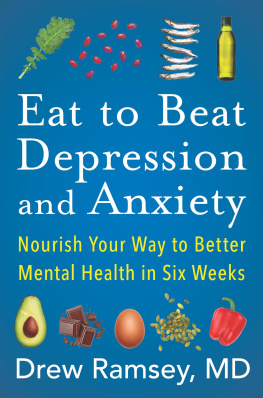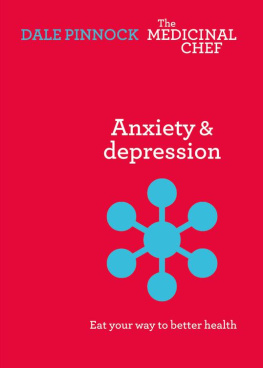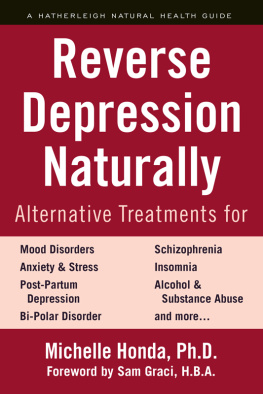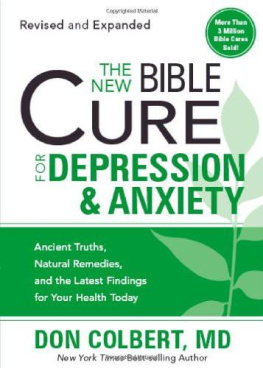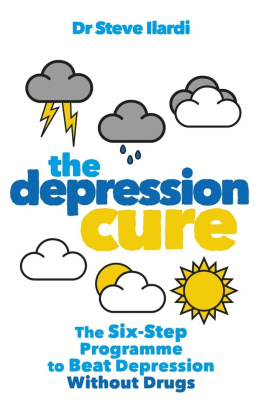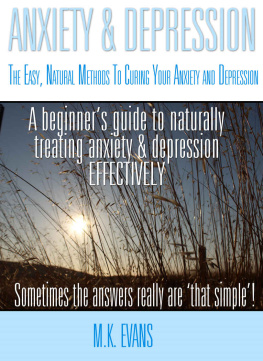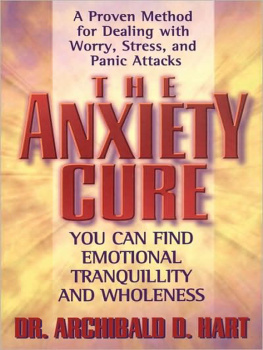Angela Dailey is a licensed clinical social worker who has been treating all types of mental illness for 25 years. She also teaches psychology and sociology at the college level. She writes continuing education courses on topics related to attaining optimum mental health through healthy lifestyle choices and maintains a blog about nutrition and mental health at MentalHealthFood.net and its popular sister Facebook page, facebook.com/mentalhealthfood.
COOKING TO CURE
A nutritional approach to anxiety and depression
Angela Dailey, BA, MSW, LCSW
Cooking to Cure: a nutritional approach to anxiety and depression
Copyright: Angela Dailey
Published: February 1, 2015
The right of Angela Dailey to be identified as author of this Work has been asserted by her in accordance with sections 77 and 78 of the Copyright, Designs and Patents Act 1988. All rights reserved. No part of this publication may be reproduced, stored in retrieval system, copied in any form or by any means, electronic, mechanical, photocopying, recording or otherwise transmitted without written permission from the publisher. You must not circulate this book in any format. This book is licensed for your personal enjoyment only.
The information and suggestions provided in this book are not intended as a substitute for advice from your physician. Consult with your physician before beginning any dietary regimen. Recommendations in this book are intended only as guidelines; needs of individuals will vary. The author shall not be liable for any injury or damage allegedly arising from any information or suggestions in this book.
Cover art by Preston Baggette
For all of those suffering with anxiety and depression, and the people who love them, who are looking for more answers.
Gratitude
To my children, whose love and support for me, and each other, are the best things in my life.
Table of Contents
Preface
M y interest in nutrition began around 1973 when someone gave me a copy of Adelle Daviss book, Lets Eat Right to Keep Fit. Adelle Davis was the forerunner of all the nutrition gurus we have today and probably 30 years ahead of her time. While she was the most popular and influential nutritionist during the 1960s and 1970s, some of her, at the time radical, ideas were heavily criticized. She believed that in addition to many physical illnesses, mental and social ills like alcoholism and suicide could be prevented with proper nutrition. Now, close to 50 years after her original assertions, alcoholism and suicide have been linked to nutritional deficiencies and her ideas about processed and refined food, hydrogenated fats, and excessive sugar seem more relevant than ever. Her book gave me an appreciation for the connection between what we eat and how we feel, mentally as well as physically. I was about 17 years old then. I still own my original, now a bit yellowed, dog-eared, and battered, copy of that book as well as two of her other books Ive had for nearly as long, Lets Have Healthy Children and Lets Get Well. Although I confess to straying rather far off track at times over the years, those books influenced me profoundly throughout my adult life.
I had a friend at U.C. Davis at that time whose father worked as a television producer in the Bay Area of California. He suffered a rare stroke that carried a dismal prognosis. With the treatment they were able to offer, the doctors gave him a few months to live. Incredibly, a woman came into the same hospital on the same day with the same type of stroke. Her prognosis was, of course, the same. She received the available medical treatment. My friends father contacted Adelle Davis. As I remember the story, because of the urgency of the situation, Adelle stayed up for 48 hours straight researching an individualized diet plan, involving both food and supplements, to help him. He followed her recommended protocol and fully recovered. The other stroke victim suffered the predicted outcome; she lived for a short time and died.
One of my first direct experiences with Adelle Daviss recommendations was with my 8-month old niece, Rebecca. Rebecca and her mother, Lorene, came from their home in Utah, to stay with us for a couple of months in our remote Montana cabin. Rebecca had what Lorene called crying jags where, for no apparent reason, she would scream and scream until she exhausted herself and fell asleep. We tried frantically to discover the source of her distress. Her diapers were dry, she was fed, held, rocked and cooed. Day after day, every waking minute was the same; Rebecca screamed. Nothing seemed to console or soothe her. Lorene said she behaved that way since she could remember. After two weeks, all of our nerves were frazzled. And we found no relief for poor Rebecca. We were 60 miles from the nearest doctor, where we would have taken her but Rebecca had already been to her doctor in Utah to no avail. It was then I thought of trying to find an answer in Adelle Daviss book, Lets Have Healthy Children. Sure enough, Rebeccas symptoms were in the book. Adelle said Rebecca was suffering from a deficiency in calcium and magnesium and recommended it in the form of dolomite (a common mineral that occurs as crystals in large rock beds of limestone that is pulverized and made into tablets). She gave the recommended dosage and said the tablets should be crushed and added to her bottle. We saw an immediate improvement with the first bottle and after the second bottle, Rebecca stopped the incessant screaming and never did it again! Rebecca began spending her waking hours smiling, playing, and enjoying the world around her. Lorene continued to add the dolomite to Rebeccas bottle until after she was eating a variety of solid foods and not taking a bottle anymore. Once her deficiency had been corrected she was, apparently, able to meet her need for calcium and magnesium with the addition of a variety of foods.
While the truth and power of nutrition as prevention and cure seemed obvious to me, apparently it was lost on mainstream Western society. Much like the electric car that was invented around the same time that Adelle Daviss books were popular, something that could have taken us into the 21st century healthier and cheaper in the long run, was swept aside as family farms were replaced by corporate agriculture and Western medicine steamrolled down a single track of looking at illness instead of health, prodded by ever-larger pharmaceutical companies that had much to gain from people being sick and nothing at all to gain from people being healthy. We became a fast-food, quick-fix, culture. Why take the time to figure out the cause of a problem when we can just pop a pill to fix it right now? People stopped cooking and eating homemade meals at home as TV dinners made it easier for both parents to be wage earners outside the home without facing the time consuming chore of preparing foods and cooking. Pop Tarts replaced cooked breakfasts and canned Spaghetti-Os masqueraded as real lunches and dinners as processed foods of all kinds found their way to grocery stores on every corner across the country. Fewer people were growing their own food, buying fresh foods at their local markets, baking bread and cooking meals from wholesome, healthy ingredients. Who wanted to spend 2 hours making macaroni and cheese from scratch when you could buy it in a box and make it in 5 minutes? Not to mention, you could buy it cheap. We traded wholesomeness for convenience.
We were blind to the dangers of preservatives that were added to the food so it would keep longer on the grocery store shelves without spoiling. And to the effects of all the chemical ingredients that were in the packaged foods that we didnt recognize and couldnt pronounce. We trusted that they were not harmful. We had the FDA (Food and Drug Administration) looking out for us. No one would put anything in our food that would harm us,
Next page
